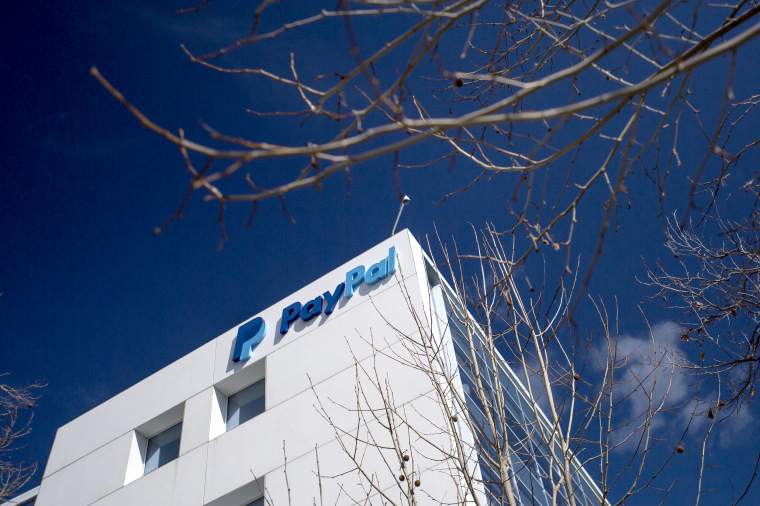After violent Trump supporters stormed the Capitol last week, several mainstream payment companies pledged to sever ties with groups or individuals promoting hate and violence.
Stripe, PayPal and Square said that they had stopped providing services to individuals and organizations connected to the riot as part of a sweeping enforcement of policies against inciting violence.
But extremism experts say it’s too little, too late. The flurry of activity and public pledges follows years of efforts by extremism and brand safety experts to get payment companies to better police their platforms to ensure they don’t let hate groups receive direct donations or provide them payment tools for selling merchandise.
“It’s unfortunate it takes these acts of violence for them to take white nationalism seriously,” said Jade Magnus Ogunnaike, senior campaigns director of Color of Change, a civil rights advocacy group. “It’s only when we have armed insurrectionists storm the Capitol building, urinate in people’s offices, steal their computers and kill a member of the Capitol Police that they see it as a big enough issue.”
On Sunday, Stripe said it had stopped processing payments for President Donald Trump’s campaign website because it violated its policies against inciting violence.
On Monday, PayPal stopped providing payment tools to GiveSendGo, a Christian crowdfunding site that helped raise money for people who attended last week’s Capitol riots, said PayPal spokesperson Justin Higgs. GiveSendGo also raised money for the legal defense of Kyle Rittenhouse, charged with killing two protesters last August in Kenosha, Wisconsin, and the Proud Boys leader Enrique Tarrio.
Higgs said that the company works “to ensure that our services are not used to accept payments for activities that promote hate speech, violence or other forms of intolerance” and that it regularly reviews accounts for prohibited activity. The company is currently reviewing accounts associated with last week’s riots for possible termination, he added.
GiveSendGo’s founder Jacob Wells said PayPal’s account of what happened was not accurate and that GiveSendGo decided to stop using PayPal after receiving a request from the payment processor to “censor” some campaigns.
“We broke up first lol,” he wrote in an email to NBC News.
Wells also clarified that while the site does not raise money for campaigns, someone created a fundraising campaign on the site to fund people to attend the events at the capitol.
Square, a mobile payments processor, continually monitors accounts that may promote violence, discrimination or dehumanization, according to a company spokesperson who spoke on the condition of anonymity out of safety concerns. But following the riots at the Capitol, the company deactivated accounts affiliated with those events, the spokesperson added.
More traditional banking institutions are also reconsidering some customer relationships following the Capitol riots. American Express told NBC News it may cancel relationships with merchants that are “harmful to our brand, engage in illegal behavior or violate the terms and conditions of our merchant agreements.”
Delayed response
But experts who have tracked the fundraising capacity of hate groups for years questioned why it had taken so long to make these changes
“I’m happy they are taking a stand. But it feels like too little, too late,” said Ogunnaike, noting that Color of Change has been sounding the alarm for years.
In 2017 the nonprofit launched a campaign called Blood Money, which identified white nationalist and supremacist websites and attempted to disrupt their funding mechanisms.
“We were given the runaround. Financial companies totally ignored us or said that the amount of money raised through their platforms was so minuscule it wasn’t important,” she said. “Then Charlottesville happened and we see the real life effects of white nationalist digital organizing.”
“I’m not impressed,” said Michael Hayden, spokesman for the Southern Poverty Law Center, noting a pattern of “whack-a-mole” efforts by tech companies after violent events over the last five years.
“Periodically there are moments that spring up in which the subject of far-right extremism becomes almost impossible to ignore. Bad press becomes a driving factor and companies take responsibility for specific accounts rather than changing their overall policies or bringing in people who can moderate their service with a level of sophistication and care," he said.
Hayden said there were similar crackdowns after the deadly "unite the right" rally in Charlottesville, Virginia, in 2017, and mass shootings at a synagogue in Pittsburgh in October 2018; at mosques in Christchurch, New Zealand, in March 2019; and at a Walmart in El Paso, Texas, in August 2019.
The invasion of the Capitol last week highlighted a “serious correlation between the free market and far-right extremism that is not being discussed,” he added.
“We have people with mall-wear T-shirts advertising a civil war while they engage in insurrection. Hats that look like something you’d wear to a child’s Little League game. Where are they getting this stuff?" Hayden said. "You have Qanon material on Amazon. The degree to which this hate and extremism is being sold on these platforms by these vendors is something we’re all reckoning with.”
Amazon started to remove merchandise related to QAnon this week, the company said on Monday.
Changing sentiments
But Nandini Jammi, a brand safety consultant who runs campaigns dedicated to making hate speech and disinformation unprofitable, was more hopeful.
“I never thought I would live to see the day that Stripe bans the president,” she said. “Tech companies have convinced us that they are a public utility available to all, and for the first time they have come to terms with the fact that they must draw a line somewhere, because where we are at is not tenable.”
Hayden also noted that there are financial benefits to the steps payment companies are finally making. “Taking aggressive steps to make sure your company is not fueling an insurrection strikes me as being good business," he said.

